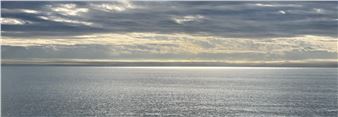Partition in the Modern World: Transdiasporic Art Perspectives
A partition is a change of political borders cutting through at least one territory, often dividing a homeland and fracturing communities along religious, ethnic, or other political lines. The 20th century saw over 25 countries partitioned worldwide, causing bloodshed, ethnic violence, and forced migrations of large segments of populations across the globe.
Partition in the Modern World: Transdiasporic Art Perspectives engages eleven different geopolitical partitions: the partitions of Palestine (1947, 1967, ongoing), Bosnia (1992), Cyprus (1974), Ireland (1921), Germany (1945), Mexico (1848), Native North America (1830-1850), India (1947), Pakistan/Bangladesh (1971), and Kashmir (1947, 1962, 1965).
The artists in this exhibition poetically probe the geopolitical phenomenon of partitioning a country and its aftermath through the dual lenses of cultural memories and multiple diasporic locations, laying bare the reverberations of partitions individually, locally, and globally. Examining, questioning, and protesting these partitions in the registers of human rights, political actors, and gendered fallout, the works engage partition as a political tool and its relevance now, in post-9/11 America and globally.
This exhibition also makes transdiasporic connections between different historical partitions. The Transdiaspora Art Project, founded by Pritika Chowdhry, has created a curatorial framework that brings artists together from disparate diasporic locations, around common overarching themes.

Recommended for you
A partition is a change of political borders cutting through at least one territory, often dividing a homeland and fracturing communities along religious, ethnic, or other political lines. The 20th century saw over 25 countries partitioned worldwide, causing bloodshed, ethnic violence, and forced migrations of large segments of populations across the globe.
Partition in the Modern World: Transdiasporic Art Perspectives engages eleven different geopolitical partitions: the partitions of Palestine (1947, 1967, ongoing), Bosnia (1992), Cyprus (1974), Ireland (1921), Germany (1945), Mexico (1848), Native North America (1830-1850), India (1947), Pakistan/Bangladesh (1971), and Kashmir (1947, 1962, 1965).
The artists in this exhibition poetically probe the geopolitical phenomenon of partitioning a country and its aftermath through the dual lenses of cultural memories and multiple diasporic locations, laying bare the reverberations of partitions individually, locally, and globally. Examining, questioning, and protesting these partitions in the registers of human rights, political actors, and gendered fallout, the works engage partition as a political tool and its relevance now, in post-9/11 America and globally.
This exhibition also makes transdiasporic connections between different historical partitions. The Transdiaspora Art Project, founded by Pritika Chowdhry, has created a curatorial framework that brings artists together from disparate diasporic locations, around common overarching themes.
Artists on show
- Aida Hasanovic
- Anagh Banerjee
- Ansab Jehan
- Dörte Weber
- Gail Ritchie
- Jafra Abu Zoulouf
- Kara Cobb Johnson
- Lana Cmajcanin
- Lia Lapithi
- Madhurima Ganguly
- Manal Deeb
- Mariyeh Mushtaq
- Meena Matai
- Nadine Nashef
- Nitasha Jaini
- Raisa Kabir
- Roman Robroek
- Sabine Senft
- Salma Arastu
- Shameera Din Wiest
- Sonia Ahmad
- Tulika Ladsariya
- Ursula Burke
Related articles
A partition is a change of political borders cutting through at least one territory, often dividing a homeland and fracturing communities along religious, ethnic, or other political lines.














